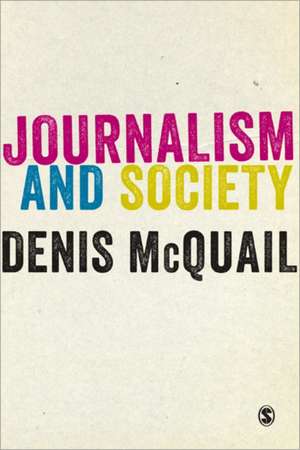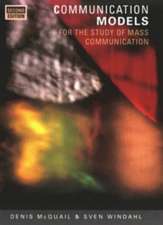Journalism and Society
Autor Denis McQuailen Limba Engleză Paperback – 14 mar 2013
- Stephen Coleman, University of Leeds
"For a half century we have spoken earnestly of journalism's responsibility to society instead of to business and government. Now this concept is given sophistication unmatched, by the best scholar of media theory of his generation."
- Clifford Christians, University of Illinois
"The grand old man of communication theory presents an overarching social theory of journalism that goes beyond the usual Anglo-American focus."
- Jo Bardoel, University of Amsterdam (ASCoR) and Nijmegen
"This book deals with the eternal question of how journalism is linked to society... I cannot think of a better staple food for students of journalism at all levels."
- Kaarle Nordenstreng, University of Tampere
This is a major new statement on the role of journalism in democracy from one of media and communication's leading thinkers. Denis McQuail leads the reader through a systematic exploration of how and why journalism and society have become so inextricably entwined and - as importantly - what this relationship should be like. It is a strong re-statement of the fundamental values that journalism aspires to. Written for students, this book:
- Makes the theory accessible and relevant
- Teaches the importance of journalism to power and politics
- Explores the status and future of journalism as a profession
- Outlines the impact and consequences of the digital
- Reveals journalism as it is, but also as it should be
- Takes each chapter further with guided reading list and free online journal articles.
| Toate formatele și edițiile | Preț | Express |
|---|---|---|
| Paperback (1) | 295.64 lei 3-5 săpt. | +20.08 lei 4-10 zile |
| SAGE Publications – 14 mar 2013 | 295.64 lei 3-5 săpt. | +20.08 lei 4-10 zile |
| Hardback (1) | 866.25 lei 6-8 săpt. | |
| SAGE Publications – 14 mar 2013 | 866.25 lei 6-8 săpt. |
Preț: 295.64 lei
Nou
Puncte Express: 443
Preț estimativ în valută:
56.58€ • 61.43$ • 47.53£
56.58€ • 61.43$ • 47.53£
Carte disponibilă
Livrare economică 01-15 aprilie
Livrare express 15-21 martie pentru 30.07 lei
Preluare comenzi: 021 569.72.76
Specificații
ISBN-13: 9781446266809
ISBN-10: 144626680X
Pagini: 256
Ilustrații: black & white tables, figures
Dimensiuni: 156 x 234 x 14 mm
Greutate: 0.39 kg
Ediția:First Edition
Editura: SAGE Publications
Colecția Sage Publications Ltd
Locul publicării:London, United Kingdom
ISBN-10: 144626680X
Pagini: 256
Ilustrații: black & white tables, figures
Dimensiuni: 156 x 234 x 14 mm
Greutate: 0.39 kg
Ediția:First Edition
Editura: SAGE Publications
Colecția Sage Publications Ltd
Locul publicării:London, United Kingdom
Recenzii
Every serious student of journalism should read this book. Combining sophisticated analysis with an accessible writing style, Denis McQuail has succeeded in producing a work of scholarship that shows what journalists do and what they should do.
Stephen Coleman
Professor of Political Communication, Institute of Communications Studies, University of Leeds
This luminous book sets a new standard for the textbook genre. Brilliant in contents, crystal-clear precision where every sentence counts, rigorous with ideas, it teaches the world mind. For a half century we have spoken earnestly of journalism's responsibility to society instead of to business and government. Now this concept is given sophistication unmatched, by the best scholar of media theory of his generation.
Clifford Christians
University of Illinois
This is going to be a must-read in journalism and communication classes. McQuail quality as we know it.
Christina Holtz-Bacha
University of Erlangen-Nuremberg
Journalism, as a profession, evolves, becoming increasingly complex and diverse. Especially now we need to be reminded where it came from, how it works, and where it stands in society. Denis McQuail provides the indispensable gateway.
Mark Deuze
University of Amsterdam
At a time when the journalistic profession is fundamentally challenged by technological transformations and new business models, Denis McQuail reminds us of the continuing social and political relevance of journalism in and for democratic societies. The grand old man of communication theory presents an overarching social theory of journalism that goes beyond the usual Anglo-American focus and develops a truly global scope, reflecting both his own previous work as well as that of many others. The master of synthesis offers an excellent overview of the position and mission of journalism in an information society that opens up the field of journalism and journalism studies for both students and scholars.
Jo Bardoel
Professor of Journalism and Media, University of Amsterdam (ASCoR) and Nijmegen, the Netherlands
In Journalism and Society Denis McQuail is at his best. He presents a very insightful revision of the sociological reflection on journalism and society, discussing the important implications of the new communication technologies for journalism of the 21st century. The declared aim of the book is to identify and describe the principles of journalism most widely recognized. McQuail goes well beyond, providing sound theoretical foundations of a new sociological paradigm of public communication in deeply transformed media and information environments. At the same time the book is a firm guide in the understanding of the principles of a profession that is a core activity of modern societies. A must-read book for students, academics and journalists.
Gianpietro Mazzoleni
Professor of Sociology of Communication, University of Milan, Italy
This book deals with the eternal question of how journalism is linked to society. Its nine chapters cover all pertinent aspects of journalism, including its freedom and responsibility, as well as issues such as the power of the press and the future of the press as an institution in the age of internet. All this is done with an analytical insight of the encyclopedic authority behind Mass Communication Theory. Also, pedagogically it is an exemplary textbook with each chapter including boxes to summarize the points, a conclusion to wind up, and selected further readings to support homework. I cannot think of a better staple food for students of journalism at all levels.
Kaarle Nordenstreng
Professor Emeritus of Journalism and Mass Communication, University of Tampere, Finland
Stephen Coleman
Professor of Political Communication, Institute of Communications Studies, University of Leeds
This luminous book sets a new standard for the textbook genre. Brilliant in contents, crystal-clear precision where every sentence counts, rigorous with ideas, it teaches the world mind. For a half century we have spoken earnestly of journalism's responsibility to society instead of to business and government. Now this concept is given sophistication unmatched, by the best scholar of media theory of his generation.
Clifford Christians
University of Illinois
This is going to be a must-read in journalism and communication classes. McQuail quality as we know it.
Christina Holtz-Bacha
University of Erlangen-Nuremberg
Journalism, as a profession, evolves, becoming increasingly complex and diverse. Especially now we need to be reminded where it came from, how it works, and where it stands in society. Denis McQuail provides the indispensable gateway.
Mark Deuze
University of Amsterdam
At a time when the journalistic profession is fundamentally challenged by technological transformations and new business models, Denis McQuail reminds us of the continuing social and political relevance of journalism in and for democratic societies. The grand old man of communication theory presents an overarching social theory of journalism that goes beyond the usual Anglo-American focus and develops a truly global scope, reflecting both his own previous work as well as that of many others. The master of synthesis offers an excellent overview of the position and mission of journalism in an information society that opens up the field of journalism and journalism studies for both students and scholars.
Jo Bardoel
Professor of Journalism and Media, University of Amsterdam (ASCoR) and Nijmegen, the Netherlands
In Journalism and Society Denis McQuail is at his best. He presents a very insightful revision of the sociological reflection on journalism and society, discussing the important implications of the new communication technologies for journalism of the 21st century. The declared aim of the book is to identify and describe the principles of journalism most widely recognized. McQuail goes well beyond, providing sound theoretical foundations of a new sociological paradigm of public communication in deeply transformed media and information environments. At the same time the book is a firm guide in the understanding of the principles of a profession that is a core activity of modern societies. A must-read book for students, academics and journalists.
Gianpietro Mazzoleni
Professor of Sociology of Communication, University of Milan, Italy
This book deals with the eternal question of how journalism is linked to society. Its nine chapters cover all pertinent aspects of journalism, including its freedom and responsibility, as well as issues such as the power of the press and the future of the press as an institution in the age of internet. All this is done with an analytical insight of the encyclopedic authority behind Mass Communication Theory. Also, pedagogically it is an exemplary textbook with each chapter including boxes to summarize the points, a conclusion to wind up, and selected further readings to support homework. I cannot think of a better staple food for students of journalism at all levels.
Kaarle Nordenstreng
Professor Emeritus of Journalism and Mass Communication, University of Tampere, Finland
Cuprins
Preface
WHAT IS JOURNALISM? HOW IS IT LINKED TO SOCIETY?
Introduction
Origins of Journalism
The Journalism-Society Link: Levels of Analysis and Theoretical Perspectives
The Main Concerns of Social Theory of Journalism
Diversity and Diversification of Journalism
Journalism and Changing Technology: Implications for Society
Defining Journalism and the News Today
The Press as an Institution
The 'Power of the Press'
What Society Expects from Journalism
The Self-Image of the Social Role of the Press
Conclusions: Questions to Be Addressed
JOURNALISTIC RESPONSIBILITY TO SOCIETY
Introduction
Defining Journalistic Responsibility
Publication and the Public Interest
The Foundations of Journalistic Obligation
Free Press Theory
Journalism as Meeting Essential Needs of Society
The Press as Fourth Estate
The Idea of a 'Public Sphere'
Social Responsibility Theory
Critical Theory
Minority Media Theory; Democratic-Participant Theory
New Movements in Journalism
Internet News Theory
Looking for a Structure in Social Theory of the Press
Conclusion
PRINCIPLES OF JOURNALISTIC PERFORMANCE
Introduction
Basic Publication Values in the Public Interest
Truth as a Principle
Freedom as a Principle
Equality, Diversity and Solidarity as Principles
Order and Cohesion as Principles for Journalism
Conclusion
TOWARDS A FRAMEWORK OF ANALYSIS FOR JOURNALISM
Introduction
Alternative Approaches
On Journalism as a Profession: A Unifying Approach
Does Journalism have its Own 'Ideology'?
The Occupational Roles of Journalism
Conflicts and Mixed Expectations
Demand versus Supply of News
Changing Goals and Types of Journalism
If Not a Profession, at Least a 'Public Occupation'
Conclusion
THE CENTRAL ROLE OF MONITOR AND MESSENGER
Introduction
The Main Roles or Functions of the Press
The Monitor and Messenger Role Characterized
Objectivity as a Guiding Principle
Limitations to Objectivity
Degrees of Purpose and Activity in Objective News Journalism
Tensions Internal to the Monitorial Role
The Monitorial Role and State Power
The Monitorial Role and Democracy
Sources of Bias in the Monitorial Role
'Media Logic' and 'Mediatisation' Effects on Monitoring
Conclusion
MEDIA STRUCTURE, PERFORMANCE AND THE 'POWER OF THE PRESS'
Introduction
What Is a Media System?
Influences from Social Structure on Media Systems
Political Factors
Economic Factors
Social Cultural Influences
Media System Influences on Journalism
Influences at the Level of Organisation
The Question of Press Effects on Society
Informational Effects of News
Persuasion Influences via News
Effects on Behaviour in Society - Individual and Collective
In Overview: Primary Determinants of the 'Power of the Press'
Conclusion
ACCOUNTABILITY OF JOURNALISM TO SOCIETY
Introduction
The Main Issues of Regulation and Accountability
Journalistic Responsibility
The Accountability of Journalism
Lines of Accountability of Journalism
Forms of Governance and Accountability Applied to Journalism
Mechanisms of Accountability: External
Mechanisms of Accountability: Internal
Informal and 'Illegitimate' Mechanisms of Control/Accountability
Three Frames of Accountability Relationship
Accountability in Overview
Conclusion
CHANGING MEDIA TECHNOLOGY: CONSEQUENCES FOR JOURNALISM, PRESS INSTITUTION AND ITS RELATIONS WITH SOCIETY
Introduction
The Potential of the Internet and Other New Media
Problematic Aspects of Media Change
Initial Signs of Change
The Internet: Liberating Promise Unfulfilled?
Effects of Media Change on Journalism Itself
The Future of the Press Institution
The Journalism-Society Relationship
The Question of Trust
Consequences for the Public Sphere
In Overview
Conclusion
IN CONCLUSION: STRIKING A NORMATIVE BALANCE
Introduction
A Frame of Reference for Journalism and Society
Normative Contexts and Choices: Different Levels of Application
Journalism in an Information Society
The Main Normative Issues of Journalism and Society in Review
Towards a Universal Normative Theory of Journalism?
The Consequences of Ongoing Changes in Media Technology and Structure for Normative Relations between Journalism and Society
What Can Be Done? Reflections on the Chances for Better Journalism
Last Word
Appendix: Selectde Documents Relating to Righrs and Obligations of News Media
References
Index
WHAT IS JOURNALISM? HOW IS IT LINKED TO SOCIETY?
Introduction
Origins of Journalism
The Journalism-Society Link: Levels of Analysis and Theoretical Perspectives
The Main Concerns of Social Theory of Journalism
Diversity and Diversification of Journalism
Journalism and Changing Technology: Implications for Society
Defining Journalism and the News Today
The Press as an Institution
The 'Power of the Press'
What Society Expects from Journalism
The Self-Image of the Social Role of the Press
Conclusions: Questions to Be Addressed
JOURNALISTIC RESPONSIBILITY TO SOCIETY
Introduction
Defining Journalistic Responsibility
Publication and the Public Interest
The Foundations of Journalistic Obligation
Free Press Theory
Journalism as Meeting Essential Needs of Society
The Press as Fourth Estate
The Idea of a 'Public Sphere'
Social Responsibility Theory
Critical Theory
Minority Media Theory; Democratic-Participant Theory
New Movements in Journalism
Internet News Theory
Looking for a Structure in Social Theory of the Press
Conclusion
PRINCIPLES OF JOURNALISTIC PERFORMANCE
Introduction
Basic Publication Values in the Public Interest
Truth as a Principle
Freedom as a Principle
Equality, Diversity and Solidarity as Principles
Order and Cohesion as Principles for Journalism
Conclusion
TOWARDS A FRAMEWORK OF ANALYSIS FOR JOURNALISM
Introduction
Alternative Approaches
On Journalism as a Profession: A Unifying Approach
Does Journalism have its Own 'Ideology'?
The Occupational Roles of Journalism
Conflicts and Mixed Expectations
Demand versus Supply of News
Changing Goals and Types of Journalism
If Not a Profession, at Least a 'Public Occupation'
Conclusion
THE CENTRAL ROLE OF MONITOR AND MESSENGER
Introduction
The Main Roles or Functions of the Press
The Monitor and Messenger Role Characterized
Objectivity as a Guiding Principle
Limitations to Objectivity
Degrees of Purpose and Activity in Objective News Journalism
Tensions Internal to the Monitorial Role
The Monitorial Role and State Power
The Monitorial Role and Democracy
Sources of Bias in the Monitorial Role
'Media Logic' and 'Mediatisation' Effects on Monitoring
Conclusion
MEDIA STRUCTURE, PERFORMANCE AND THE 'POWER OF THE PRESS'
Introduction
What Is a Media System?
Influences from Social Structure on Media Systems
Political Factors
Economic Factors
Social Cultural Influences
Media System Influences on Journalism
Influences at the Level of Organisation
The Question of Press Effects on Society
Informational Effects of News
Persuasion Influences via News
Effects on Behaviour in Society - Individual and Collective
In Overview: Primary Determinants of the 'Power of the Press'
Conclusion
ACCOUNTABILITY OF JOURNALISM TO SOCIETY
Introduction
The Main Issues of Regulation and Accountability
Journalistic Responsibility
The Accountability of Journalism
Lines of Accountability of Journalism
Forms of Governance and Accountability Applied to Journalism
Mechanisms of Accountability: External
Mechanisms of Accountability: Internal
Informal and 'Illegitimate' Mechanisms of Control/Accountability
Three Frames of Accountability Relationship
Accountability in Overview
Conclusion
CHANGING MEDIA TECHNOLOGY: CONSEQUENCES FOR JOURNALISM, PRESS INSTITUTION AND ITS RELATIONS WITH SOCIETY
Introduction
The Potential of the Internet and Other New Media
Problematic Aspects of Media Change
Initial Signs of Change
The Internet: Liberating Promise Unfulfilled?
Effects of Media Change on Journalism Itself
The Future of the Press Institution
The Journalism-Society Relationship
The Question of Trust
Consequences for the Public Sphere
In Overview
Conclusion
IN CONCLUSION: STRIKING A NORMATIVE BALANCE
Introduction
A Frame of Reference for Journalism and Society
Normative Contexts and Choices: Different Levels of Application
Journalism in an Information Society
The Main Normative Issues of Journalism and Society in Review
Towards a Universal Normative Theory of Journalism?
The Consequences of Ongoing Changes in Media Technology and Structure for Normative Relations between Journalism and Society
What Can Be Done? Reflections on the Chances for Better Journalism
Last Word
Appendix: Selectde Documents Relating to Righrs and Obligations of News Media
References
Index
Notă biografică
Descriere
A major new statement on the role of journalism in democracy from one of media and communication's leading thinkers. This textbook is the perfect answer to the how and why of journalism. It is crucial reading for any student of media studies, communication studies and journalism.















